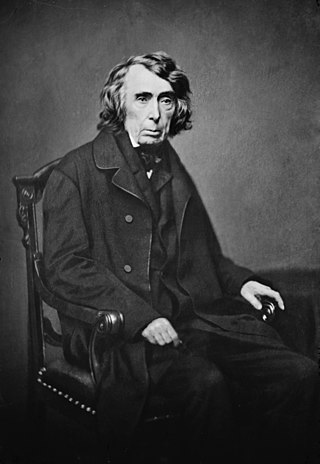Related Research Articles
Habeas corpus is a recourse in law through which a person can report an unlawful detention or imprisonment to a court and request that the court order the custodian of the person, usually a prison official, to bring the prisoner to court, to determine whether the detention is lawful.

Ex parte Merryman, 17 F. Cas. 144 (No. 9487), was a controversial U.S. federal court case that arose out of the American Civil War. It was a test of the authority of the President to suspend "the privilege of the writ of habeas corpus" under the Constitution's Suspension Clause, when Congress was in recess and therefore unavailable to do so itself. More generally, the case raised questions about the ability of the executive branch to decline to enforce judicial decisions when the executive believes them to be erroneous and harmful to its own legal powers.
"Prerogative writ" is a historic term for a writ that directs the behavior of another arm of government, such as an agency, official, or other court. It was originally available only to the Crown under English law, and reflected the discretionary prerogative and extraordinary power of the monarch. The term may be considered antiquated, and the traditional six comprising writs are often called the extraordinary writs and described as extraordinary remedies.
Ex parte McCardle, 74 U.S. 506 (1869), is a United States Supreme Court decision that considered its jurisdiction to review decisions of lower courts under federal law.
A writ of coram nobis is a legal order allowing a court to correct its original judgment upon discovery of a fundamental error that did not appear in the records of the original judgment's proceedings and that would have prevented the judgment from being pronounced. The term coram nobis is Latin for "before us" and the meaning of its full form, quae coram nobis resident, is "which [things] remain in our presence". The writ of coram nobis originated in the courts of common law in the English legal system during the sixteenth century.
Kenneth Francis Ripple is a Senior United States circuit judge of the United States Court of Appeals for the Seventh Circuit.
Actual innocence is a special standard of review in legal cases to prove that a charged defendant did not commit the crimes that they were accused of, which is often applied by appellate courts to prevent a miscarriage of justice.
Paul Cézanne University was a public research university based in the heart of Provence, in both Aix-en-Provence and Marseille. It was one of the three Universities of Aix-Marseille and was part of the Academy of Aix and Marseille. Its weight was considerable in the French university landscape. The university bore the name of Paul Cézanne, a prominent French artist and Post-Impressionist painter, who attended its law school from 1858 to 1861.

Yeshwant Vishnu Chandrachud was an Indian jurist who served as the 16th Chief Justice of India, serving from 22 February 1978 to the day he retired on 11 July 1985. Born in Pune in the Bombay Presidency, he was first appointed a Justice of the Supreme Court of India on 28 August 1972 and is the longest-serving Chief Justice in India's history at 7 years and 4 months. His nickname was Iron Hands after his well-regarded unwillingness to let anything slip past him.
In United States law, habeas corpus is a recourse challenging the reasons or conditions of a person's confinement under color of law. A petition for habeas corpus is filed with a court that has jurisdiction over the custodian, and if granted, a writ is issued directing the custodian to bring the confined person before the court for examination into those reasons or conditions. The Suspension Clause of the United States Constitution specifically included the English common law procedure in Article One, Section 9, clause 2, which demands that "The privilege of the writ of habeas corpus shall not be suspended, unless when in cases of rebellion or invasion the public safety may require it."

Alan W. Clarke is a lawyer best known for his work opposing the death penalty. He has pursued his position as a student, as a practicing lawyer, as a professor, and as a mentor to the movement.
In United States law, habeas corpus is a recourse challenging the reasons or conditions of a person's detention under color of law. The Guantanamo Bay detention camp is a United States military prison located within Guantanamo Bay Naval Base. A persistent standard of indefinite detention without trial and incidents of torture led the operations of the Guantanamo Bay detention camp to be challenged internationally as an affront to international human rights, and challenged domestically as a violation of the Due Process Clause of the Fifth and Fourteenth amendments of the United States Constitution, including the right of petition for habeas corpus. On 19 February 2002, Guantanamo detainees petitioned in federal court for a writ of habeas corpus to review the legality of their detention.

The Habeas Corpus Suspension Act, 12 Stat. 755 (1863), entitled An Act relating to Habeas Corpus, and regulating Judicial Proceedings in Certain Cases, was an Act of Congress that authorized the president of the United States to suspend the right of habeas corpus in response to the American Civil War and provided for the release of political prisoners. It began in the House of Representatives as an indemnity bill, introduced on December 5, 1862, releasing the president and his subordinates from any liability for having suspended habeas corpus without congressional approval. The Senate amended the House's bill, and the compromise reported out of the conference committee altered it to qualify the indemnity and to suspend habeas corpus on Congress's own authority. Abraham Lincoln signed the bill into law on March 3, 1863, and suspended habeas corpus under the authority it granted him six months later. The suspension was partially lifted with the issuance of Proclamation 148 by Andrew Johnson, and the Act became inoperative with the end of the Civil War. The exceptions to Johnson's Proclamation 148 were the States of Virginia, Kentucky, Tennessee, North Carolina, South Carolina, Georgia, Florida, Alabama, Mississippi, Louisiana, Arkansas, and Texas, the District of Columbia, and the Territories of New Mexico and Arizona.

The Nonhuman Rights Project (NhRP) is an American nonprofit animal rights organization seeking to change the legal status of at least some nonhuman animals from that of property to that of persons, with a goal of securing rights to bodily liberty and bodily integrity. The organization works largely through state-by-state litigation in what it determines to be the most appropriate common law jurisdictions and bases its arguments on existing scientific evidence concerning self-awareness and autonomy in nonhuman animals. Its sustained strategic litigation campaign has been developed primarily by a team of attorneys, legal experts, and volunteer law students who have conducted extensive research into relevant legal precedents. The NhRP filed its first lawsuits in December 2013 on behalf of four chimpanzees held in captivity in New York State. In late 2014, NhRP President Steven Wise and Executive Director Natalie Prosin announced in the Global Journal of Animal Law that the Nonhuman Rights Project was expanding its work into other countries, beginning in Switzerland, Argentina, England, Spain, Portugal, and Australia.
In law, post conviction refers to the legal process which takes place after a trial results in conviction of the defendant. After conviction, a court will proceed with sentencing the guilty party. In the American criminal justice system, once a defendant has received a guilty verdict, they can then challenge a conviction or sentence. This takes place through different legal actions, known as filing an appeal or a federal habeas corpus proceeding. The goal of these proceedings is exoneration, or proving a convicted person innocent. If lacking representation, the defendant may consult or hire an attorney to exercise his or her legal rights.
Whitmore v. Arkansas, 495 U.S. 149 (1990), is a U.S. Supreme Court Case that held that the Eighth and the Fourteenth Amendments do not require mandatory appellate review of death penalty cases and that individuals cannot file cases as a next friend unless there is a prior relationship to the appellant and unless the appellant is "unable to litigate his own cause due to mental incapacity, lack of access to court, or other similar disability".
Tarble's Case, 80 U.S. 397 (1872), was a United States Supreme Court case in which the Court held that a State judge has no jurisdiction to issue a writ of habeas corpus, or to continue proceedings under the writ when issued, for the discharge of a person held by the authority, or claim and color of the authority, of the United States by an officer of that government.
United States v. Morgan, 346 U.S. 502 (1954), is a landmark decision by the United States Supreme Court which provides the writ of coram nobis as the proper application to request federal post-conviction judicial review for those who have completed the conviction's incarceration in order to challenge the validity of a federal criminal conviction.
Kimmelman v. Morrison, 477 U.S. 365 (1986), was a decision of the U.S. Supreme Court that clarified the relationship of the right to effective assistance of counsel under the Sixth Amendment to other constitutional rights in criminal procedure. In this case, evidence against the defendant was probably seized illegally, violating the Fourth Amendment, but he lost the chance to argue that point due to his lawyer's ineffectiveness. The prosecution argued that the defendant's attempt to make a Sixth Amendment argument via a habeas corpus petition was really a way to sneak his Fourth Amendment argument in through the back door. The Court unanimously disagreed, and held that the Fourth Amendment issue and the Sixth Amendment issue represented different constitutional values, and had different requirements for prevailing in court, and therefore were to be treated separately by rules of procedure. Therefore, the habeas corpus petition could go forward. In its opinion, the Court also gave guidance on how to apply its decisions in Stone v. Powell and Strickland v. Washington.
References
- 1 2 3 4 5 6 7 8 9 10 11 "About Ronald Sokol – The Letters of Daniel Meador and Ronald Sokol". Archived from the original on 11 November 2023. Retrieved 11 November 2023.
- 1 2 "The Letters of Daniel Meador and Ronald Sokol". University of Virginia School of Law. Archived from the original on 23 November 2023. Retrieved 1 June 2022.
- ↑ Sokol, Ronald. "Thirty Years at the French Bar". University of Virginia School of Law. Archived from the original on 23 November 2023. Retrieved 23 November 2023.
- ↑ United States v. Shoaf, 341 F.2d 832 (1964)
- ↑ Leonard, Norman; Garfield, Franklin (1970). "Review of Federal Habeas Corpus" . California Law Review. 58 (2): 537–545. doi:10.2307/3479671. ISSN 0008-1221.
- ↑ "Ronald Sokol". lexhelp.com. Lexhelp. Retrieved 23 November 2023.